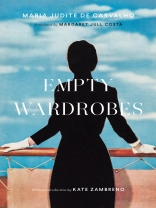“A compact, merciless tragedy… I read this novel with something resembling a rapturous grief.” —Kate Zambreno
For ten years Dora has ritualistically mourned her husband’s death, a pointless ritual that forced her to rely on support from old friends and acquaintances. Her beloved husband, a “Christ” so principled he rejected any ambition whatsoever as a construct of a corrupt society, succeeded only in leaving Dora and their daughter with nothing. When her mother-in-law reveals a shattering secret about their marriage one night, Dora’s narrative of her own life is destroyed. Three generations of women—Dora, her daughter, and mother-in-law—must navigate a world that has been shaped by the blundering men off in the distance, figures barely present who nonetheless define the lives of the women they would call mother, wife, or lover.
Narrated through the gritted teeth of an acquaintance, Empty Wardrobes—Maria Judite de Carvalho’s cutting 1966 novel, translated from Portuguese for the first time by Margaret Jull Costa and introduced by Kate Zambreno—is a tale of women who are trapped within the quiet devastation of a patriarchal society and preyed upon by the ambient savageries that perch in its every crevice.
Yazar hakkında
Margaret Jull Costa has been a literary translator for nearly thirty years and has translated works by novelists such as José Maria de Eça de Queiroz, José Saramago, Fernando Pessoa, and Javier Marías, as well as the poetry of Sophia de Mello Breyner Andresen and Ana Luísa Amaral. She has won various prizes, most recently the 2015 Marsh Award for Children’s Literature in Translation for Bernardo Atxaga’s The Adventures of Shola.












